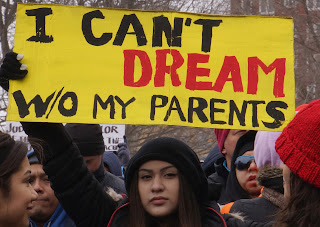I recently went to my annual physical. I knew going in that the painfully accurate scale would show me I have gained some weight, since pants have been tighter and my second chin a bit more prominent. Most of the time, I don't struggle too hard with this - I am as active as I can be, and eat relatively healthy.
I don't believe, not rationally, that fat=unhealthy, and have worked hard to get over early prejudices against myself and others in regards to body shape and size.
But beliefs run deep. Especially when it comes to our own bodies.
So when the scale showed me I weigh more than I hoped but less than I feared, I could feel the self-hatred start to creep in. Walking from the weight and height room to the examining room, even as I joked with the nurse about not putting my shoes back on, in my head I was making plans:
-Do Whole 30
-Get gym membership and go 3 times a week
The messages behind these - eat better and exercise more - are not problematic.
But the tone was. Even if Whole 30 would be good for my body, or more exercise, they will not be helpful - or sustainable - if I take this attitude towards myself --
The tone was something more like this:
-You cannot be trusted to take care of yourself without structure. Restrict your diet and stick to it.
-You must push a lot harder on exercise. You resist it too much. Just fucking do it.
I wish I could say that's when I knew I was in trouble. Instead, behind the scenes a quiet and familiar war waged. I didn't even notice it until I was out of the appointment and at home, feeling shitty. The more sensitive and human aspect of myself put up weak arguments to be kind to myself, and the more aggressive and fearful part put up far too forceful arguments to be mean to myself.
Recently, my best friend has come up with a slogan that I love (this is my phrasing of it):
"Self hatred never helps."
After my appointment, as I cried on her proverbial phone shoulder (she lives in Portland), I came back to this phrase on my own. I asked of both of us - if self hatred, which is so deep, so default and habitual, doesn't work - which I believe it doesn't - what does?
Rebecca went on to describe attentiveness, kindness, curiosity. An ongoing, everyday engagement. We discussed the habitual patterns that seem to attract self-hatred: overly regulated systems like strict diets, as well as the polar opposite: spacing out and providing no structure at all. Then we engaged the mindsets that create so much space around the hatred that it loses its power, like asking what my body wants right now.
The problem, if it is a problem, is that self-hatred is easier, more convenient, habitual.
Most of us crave easy answers - a prescripted diet or exercise plan, for instance. And for some of us, those work. Some of us respond well to regulated, even tight structure.
But in my experience coaching, teaching and human beinging, I find that most of us struggle, push back, and fight that tight of a structure. Self-hatred easily coopts whatever it can for it's own purposes, so that even if we enjoy a cleanse once, and decide we'd like to do it more regularly, behind the scenes, self hatred makes it into a project, tries to use it to punish us and prove a point.
So the answer might be diet and exercise, might even be a prescribed diet and exercise plan, but it must be flexible. Kind.
Body and diet, exercise and weight are such incredibly loaded, often poisonous waters for all of us, especially women. The last refuge of self hatred, a deeply culturally and personally embedded dark alley in the back of our minds and hearts. Coming to really feel and notice that self hatred never helps, is never a useful view or motivation, is essential. And it is a bottom line, a definite statement that underlines lots of quite less definite but strongly intuitive understandings about kindness and flexibility with ourselves and others.
These are the questions I will be contemplating around this:
-What kinds of structures seem to magnetize self-hatred?
-What kinds of structures seem to magnetize flexibility, space and understanding?
-Which causes lead to which effects? When I self hate, do I really feel better?
-Balance is flexibility - not rigidity. Where is the balance? And it is not one point, so what does it feel like when I am stressed? Traveling? Alone? With others?
It's crucial for each of us to truly feel that self hatred never helps, otherwise it is an empty adage.
Simple answers are not the mostly likely to be true when it comes to human psyche.
Self-hatred is an easy answer, a short-cut habit. It's ready availability makes it feel like truth, but it is only so accessible because it is a well-worn path, not because it is true.
Relaxing back into the complexity and feeling what is true right now needs to be paired with a deeper, more compassionate ongoing view.
For eating, for work, for life, for everything.


